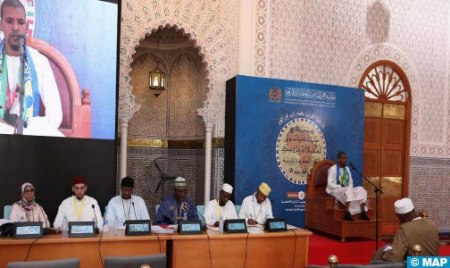
Tanzanian President Samia Suluhu Hassan welcomed Sunday the organization in Dar Es Salaam of the Mohammed VI Foundation of African Ulema’s competition for memorization, recitation and psalmody of the Holy Quran, which took place, at the Mohammed VI Mosque from August 11 to 14.
“This competition comes at the right time,” said Mrs. Suluhu Hassan at the closing ceremony of the 3rd edition of the competition in an address read on her behalf by Prime Minister Kassim Majaliwa.
The Tanzanian president expressed her gratitude to King Mohammed VI for the establishment of “this great mosque” which hosted the competition, praising the level of candidates, “who are all considered winners.”
She also praised the organization, on the sidelines of the competition, of an exhibition of manuscripts of the Holy Quran, and of a calligraphy workshop of the Holy Quran, which is “the first of its kind in Tanzania.”
For his part, the president of the Tanzanian section of the Mohammed VI Foundation of African Ulema and Mufti of the country, Aboubakary Zubeiry bin Ally, expressed his gratitude to King Mohammed VI, Commander of the Faithful, for his high patronage of this competition and his high solicitude towards the Holy Quran.
The event, held in implementation of the recommendations of the Foundation’s Supreme Council, during its second session held in 2018 in Fez, aims to encourage young generations to memorize the Holy Quran while mastering the techniques and rules of psalmody.
The Mohammed VI Foundation of African Ulema, chaired by King Mohammed VI, Commander of the Faithful, is a scientific institution created in 2015 with the aim of unifying the actions of the Ulema of Morocco and brotherly African countries to publicize, disseminate and consolidate the values of tolerant Islam.
The Fez-based institution aims to contribute to the intellectual, scientific and cultural movement in the Islamic field, foster the historical ties between Morocco and the countries of Africa and encourage the creation of religious, scientific, and cultural centers.
It also aims to promote the Islamic African cultural heritage through spreading, protecting and preserving it, while establishing ties and cultivating relations of cooperation with associations, and organizations with common interest.
